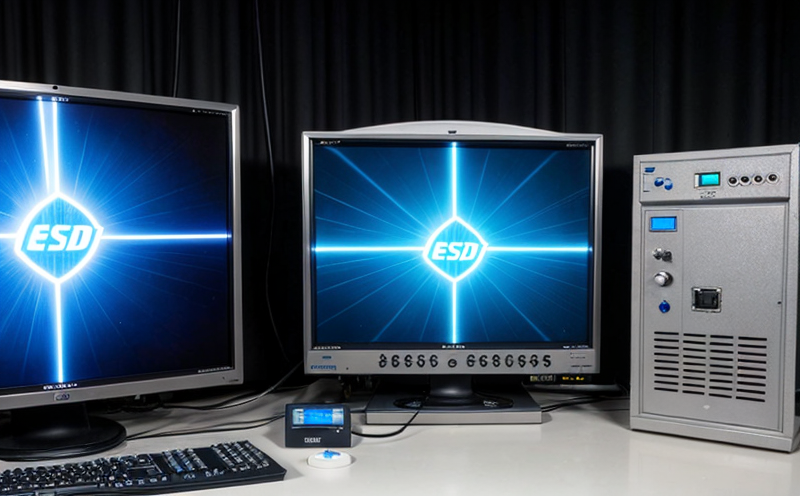IEC 61000-4-40 Conducted Disturbance Long Duration Testing
The IEC 61000-4-40 standard is a crucial part of electromagnetic compatibility (EMC) testing, focusing on conducted disturbances within the frequency range of 1 MHz to 30 MHz. This test evaluates the robustness and reliability of electronic devices under long-duration interference, particularly in industrial environments where sustained exposure to such signals can occur.
The primary goal is to ensure that semiconductor and microchip components remain functional and perform their intended functions without degradation or failure when subjected to conducted disturbances over extended periods. This testing is essential for industries that rely on high-reliability electronic systems, including telecommunications, automotive, aerospace, and medical devices.
Testing involves the application of a continuous disturbance signal to the circuit under test (CUT), which simulates real-world conditions where interference can persist for long durations. The duration of these disturbances typically ranges from 10 minutes up to several hours, depending on specific industry requirements or standards.
The testing setup includes specialized equipment capable of generating and measuring conducted disturbances. This apparatus is designed to mimic the characteristics of a typical industrial environment, ensuring that the results accurately reflect real-world performance. The test setup usually comprises an interference generator connected to the CUT via appropriate filters and attenuators to control the signal levels.
During testing, the disturbance signal is applied continuously for the specified duration, during which time the CUT's behavior is monitored using various measurement techniques. Key parameters include voltage amplitude, frequency content, and power spectral density. The test aims to assess how well the device withstands these prolonged disturbances without exhibiting any signs of malfunction or performance degradation.
Passing this test indicates that the semiconductor or microchip can maintain its operational integrity in the presence of long-duration conducted disturbances, which is critical for ensuring product reliability and compliance with international standards. The results provide valuable insights into the robustness of the device design against electromagnetic interference (EMI), thereby enhancing confidence in the product's performance across various applications.
Understanding the context within IEC 61000-4-40, this testing is particularly important for devices that operate in environments where they might be exposed to prolonged electrical noise. For instance, in industrial settings, machinery and equipment can generate significant conducted disturbances over extended periods, which may affect nearby electronic systems.
By adhering to the stringent requirements of IEC 61000-4-40, manufacturers ensure that their products meet rigorous quality standards, enhancing overall product reliability. This is especially pertinent for sectors like telecommunications and automotive, where even minor performance issues can lead to significant disruptions or safety concerns.
Scope and Methodology
The scope of IEC 61000-4-40 Conducted Disturbance Long Duration Testing encompasses the evaluation of devices' ability to withstand conducted disturbances in a controlled environment. The methodology involves several key steps:
- Test Setup Configuration: Establishing the appropriate test setup, including the selection and connection of interference generators, filters, attenuators, and measurement equipment.
- Preliminary Testing: Conducting preliminary tests to ensure that the CUT is stable and free from any inherent issues that could affect the outcome.
- Disturbance Application: Applying the conducted disturbance signal to the CUT for the specified duration, ensuring accurate measurement of all relevant parameters.
- Data Analysis: Analyzing the collected data to determine if the device meets the prescribed performance criteria. This includes evaluating voltage stability, signal integrity, and overall functionality during prolonged exposure to interference.
- Reporting: Compiling a comprehensive report detailing the test setup, parameters used, results obtained, and conclusions drawn from the analysis.
The methodology is designed to provide a robust assessment of the device's resilience against conducted disturbances, ensuring that it can perform reliably in real-world conditions. Compliance with IEC 61000-4-40 is essential for manufacturers aiming to meet stringent quality and reliability standards across various industries.
Benefits
- Enhanced Product Reliability: Ensures that devices can withstand prolonged exposure to conducted disturbances, thereby enhancing overall product reliability.
- Informed Design Decisions: Provides valuable insights into the robustness of device design against electromagnetic interference (EMI), guiding informed design decisions.
- Compliance Assurance: Ensures that products meet stringent international standards and regulations, facilitating smoother compliance processes.
- Risk Mitigation: Identifies potential weaknesses in the product's design early on, enabling timely corrective actions to mitigate risks.
- Customer Confidence: Demonstrates a commitment to quality and reliability, building trust with customers and stakeholders.
- Competitive Advantage: Provides a competitive edge by ensuring that products meet or exceed industry benchmarks for robustness and performance.
The benefits of adhering to IEC 61000-4-40 are significant, as they contribute not only to the reliability and safety of the devices but also to their broader acceptance in global markets. By ensuring compliance with this standard, manufacturers can confidently introduce products that meet high-quality standards.





